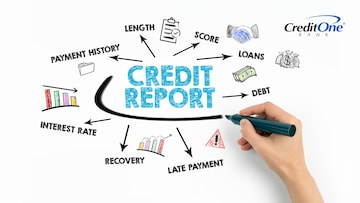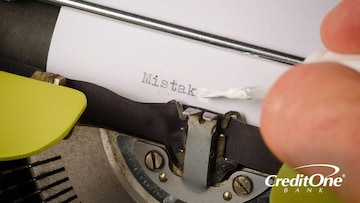Should You Worry About Credit Report Errors?
October 20, 2025
You don’t want errors on your credit report to delay your financial goals. Find out how errors affect your credit and how to dispute them.

Introduction
Your credit reports get a lot of mileage.
Credit scoring companies, like FICO and VantageScore, use your credit reports to calculate your credit score.
Lenders use credit reports (along with that score) to make an informed decision when extending credit. And then they turn around and report your activity after they’ve given you credit.
Even landlords, utility companies and prospective employers may check credit reports to help make decisions.
If your reports contain errors, they can paint an unflattering picture and hurt your prospects in all these areas. And they might be more common than you think.
A Consumer Reports and WorkMoney survey reports that 27% of respondents who checked their credit reports found at least one account information error, like an account they didn’t recognize, or on-time payments being reported as late or missed.
Mistakes can happen, but you want to put your best foot forward. Let’s see how you can find and ultimately dispute credit report errors, so they don’t affect any of your future options.
How Credit Report Errors Hurt Your Credit
Having good credit habits can help build your credit. But your history won’t help as much if the official record says something else. A credit report with errors, especially derogatory ones, can hurt your credit in a few big ways.
Errors can impact the credit you’re offered
Lenders use your credit report and credit score (which was calculated from your credit report) to get a picture of who you are as a borrower.
But if that picture includes something like a missed or late payment that was actually on time, or a delinquent account that doesn’t belong to you, you’re going to look like a much higher risk.
This could result in lower credit limits, higher interest rates, less favorable terms, or even being denied credit in the first place.
Errors can limit your employment prospects
Did you know that your credit report can influence whether you get a job offer or not?
Employers can check an applicant’s credit report in some states, although it requires your written permission. The report they see is a limited version of the full report.
It’s often used to see how a candidate handles their finances, which may also reflect qualities important to that job. It’s more common in specific industries, such as defense, chemical, pharmaceutical, and financial services.
So the next time you start polishing your resume for the job hunt, you might want to double-check your credit report, too.
Errors can affect your housing situation
Even if you aren’t taking out a mortgage, credit report errors can still have an impact on your housing situation.
Landlords can run credit checks to see how financially responsible a prospective tenant is, in addition to some of the other relevant background and employment checks they run. Much like lenders, they want to limit their risk.
And it doesn’t stop at landlords. Utility companies also have an interest in your credit history. They want to know that you pay on time and may require a security deposit or another arrangement if they see otherwise.
Checking Your Credit Report for Errors
It’s not a huge deal if you make a typo when texting a friend. And if you need to correct the error, you can do it right away.
It can be a huge deal, however, if your credit report contains an error. You probably want to catch and dispute credit report errors as soon as possible, so they don’t get in the way of life.
Fortunately, it’s pretty easy to get a copy of your credit reports these days. The federally authorized AnnualCreditReport.com allows you to get a free weekly copy of your credit report from the three major credit bureaus: Equifax, Experian and TransUnion.
It’s a good practice to check your credit reports before or after certain credit-related events, like applying for a loan or starting a job search.
And even if you go a long time between applications, it’s not a bad idea to check your reports regularly to catch errors or signs of fraud.
These can include things like accounts you don’t recognize, payments marked as late or missed, or other misentered personal information like your name or birthdate. The sooner you notice and dispute these, the sooner you can move on.
How To Dispute Credit Report Errors
If you catch an error in one of your credit reports, it’s time to get to work.
You can start by gathering any documents that support your case, then reaching out to the relevant credit reporting agency in writing or online:
Equifax Credit Report Disputes
Experian Credit Report Disputes
TransUnion Credit Report Disputes
Next, you can contact the lender in question as well. You’ll likely find their contact information on your report or through their own website.
The credit reporting agency must investigate the dispute within 30 to 45 days of receiving it and notify you of the results within five business days of completing their investigation.
Hopefully, you’ll never need to file a dispute for a credit reporting error in the first place. But it’s good to know the ins and outs of disputing the error, filing an appeal and following up, if needed.
And if you need a little help getting started, the Consumer Financial Protection Bureau offers template letters for contacting the credit reporting agencies and contacting creditors.
Bottom Line
You probably wouldn’t like it if someone spread false rumors about you. Even if they didn’t know the rumor was false, it certainly doesn’t feel great to have your reputation tarnished.
In a way, that’s not too different than having serious errors on your credit report.
Your credit report is your reputation as far as creditors are concerned. But with a little bit of foresight and preparation, you can confidently dispute credit reporting errors and maintain the reputation you deserve.
Jorge Labrador writes about credit-related topics that often come with a lot of questions, like pre-approvals, credit scores, credit building, and trending advice on social media. He's previously covered healthcare, travel, entertainment and more for nearly two decades. He likes to unwind by painting plastic fantasy miniatures, making a fancy cup of coffee or color-coding his budgeting app (again).




![How to Dispute Errors in Your Credit Report [Infographic]](/content/dam/cob-corp-acquisition/images/articles/2021/02/104343 COC_61_DisputeErrors.jpg?imwidth=360)